Articles published in May, 2023
I spent a lot of my early life very close to Portobello Road, in North Kensington, so I felt a particular attachment to the Spanish port of that name.
This is where Spain counted and loaded its treasure fleets.
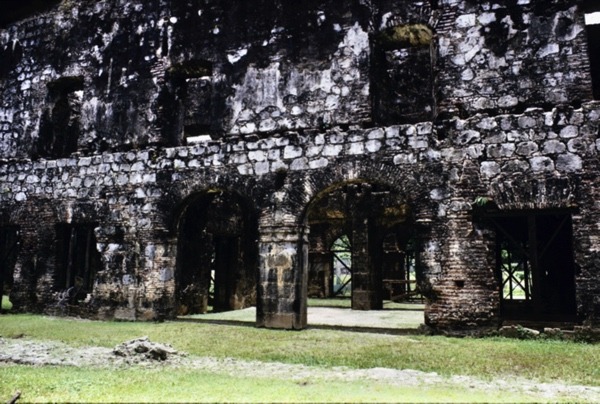
An obvious target for pirates and privateers, it was well defended. You can see the canon still lined up below, facing the Caribbean.
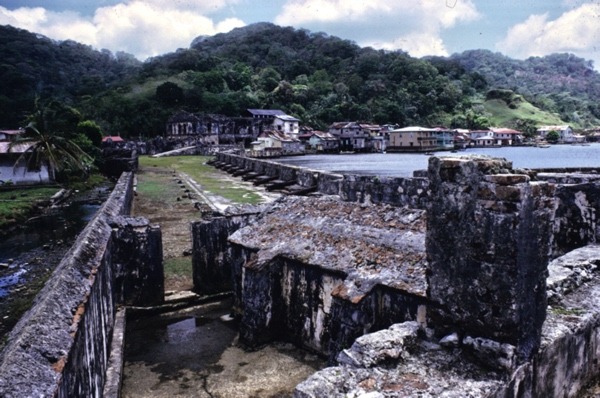
April 29th, Monday
I leave for Costa Rica. Very soon one cylinder starts missing. If it gets worse, it seems I may have to turn back. It’s hard to reject the idea. But the missing continues, uncertainly – worst when engine is asked to work harder. Fiddling with the HT lead seems to affect it. Plugs are white. I raise carb needle. That night I get close to border. David (a town) then Concepcion. Decide to go to Volcan. It’s wet but not raining. Volcan is nearly at 3000 metres. All lush but nowhere obvious for tent. At entrance to town are cabañas, $8 a night. Ask a young man where I can go. Eventually he suggests I can sleep in the garage, and tells me where to eat. Have fish, and converse with several Panamanians who are very friendly and interested in my journey. The garage is a porch with pillars. Good for a hammock. The man comes over to talk with me. He’s an evangelist and wants to do me good.
“What a remarkable coincidence,” he says, “that we should meet. If you had arrived a few minutes earlier or later, we would have missed each other.”
He is straining my sense of the miraculous, but he means well. His tracts are in Spanish, distributed free from some US mission.
“Sospendido por un hilo,” is one of them. “Pessada y hallado falta,” is another. [Hanging by a thread. Weighed and found wanting]. Like US advertising slogans, they are translated literally, word for word. Coca-cola – “Chispa de la vida.” [Spark of life] McDonalds – “Su classe de lugar. » [Your kind of place]. They say the translations really don’t work at all. I think this is a very good example of what is really offensive about North American intrusion into South America. Before sleeping I changed a coil on the bike to try and track down the fault. Put foam plastic in hammock against cold.
April 30th
Morning was lovely. Small dog was dashing about the garden, occasionally dashing towards me and then, overcome by nervousness, dashing off again. Standpipe in garden produced milky water. Rode off to highway, then to Routier at Paso Canoas (The frontier).
Not too difficult. About fifteen minutes each side. Then to first town for breakfast – quite a nice place – eggs, rice and meat – two coffees. Rode on and passed a petrol pump. [My principal vice, for I knew I should stop but wanted to change money first, which I should have done at the breakfast town but I was too impatient] and shortly afterwards ran dry.
The bike was burning too much gas and the cylinder was still missing. I got a litre of petrol off a laughing woman and gave her fifty cents for it. It didn’t last me. I stopped some telephone people, and they siphoned half a gallon for me.
The mountain range before San José took me by surprise. I hadn’t expected anything so ambitious – both high and long – very cold air and a lot of cloud/fog. Meanwhile I had changed back to the French plugs and the misfiring ceased. However, the provisional rocker-box plug was failing and I was losing oil over the engine, carb, and gearbox. Also overheating and possibly the two were connected.
Got into San Pedro at 4.30 and it began to rain. Stopped for coffee and watched two girls drinking tea and doing their nails by the window. One was very pretty and they both smiled at me a lot. Should have done something about it, but I didn’t imagine that I would be sleeping next door for two days.
When I came out, found Lee waiting by the bike. He was from Boston, had come down with two others – Richard and Gerry – on two Harley Sportsters and a truck.
[He saw that I’d come halfway round the world]
He invited me to stay. I thought I should try to get to Mark and Sally Beaudoin [friends of friends] but asked if I could come back if necessary.
“Sure,” he said. “See you tonight or tomorrow morning.”
I went on into town and saw the rain clouds ahead. Then o the turnpike it began to pour. The directions were confusing, and I rode around in buckets of rain before finding the address. They had moved out a week earlier. Now I was very thankful to know that Lee was there. He received me enthusiastically in the restaurant – called La Fanega – which they had bought only two weeks before from another American.
Half-pound hamburgers, quesoburgesas, pescoburgesas, machoburgesas, cerveça cruda (draught), dim light, good music, lots of writing on the wall.
[I stayed a few days, sleeping in a storeroom, and then moved on to another friend of a friend on the Gringo expat circuit, the Davidsons at their Santa Ana ranch. He was away but his wife, Pat Davidson, young and lonely, invited me with enthusiasm.]
The Country Club. Christina the impeccable gossip from Florida, with the perfect sweet American “ass” and the slightly buck-toothed cocktail sipper’s mouth, dispensing chat about the Foxes, the world’s most disagreeable couple – ugly as sin – he an alcoholic about to die – she a telephone addict. Forbidden the phone she uses the neighbour’s and runs up 6000 colones – $750 – in a month. A cosmetic surgery freak – her eyes lifted and two inches of stomach fat – eager to show her scars she drops her pants without provocation – “Isn’t she gross!” When he was ill last she hired a Lear jet in Miami to fly down and pick him up that instant. “It burns my stomach,” was one of Christina’s expressions.
From the rough and ready life on the road in 1975 I’m transported to the big rock candy mountain, a bubble of luxury kept inflated by the US Navy and its Marines.
April 15th, a Monday
Life in the Canal Zone begins on Rodman Marine Base. Thirties barracks buildings, big, spacious, landscaped – now a golf course runs through the middle. Captain John B. Mallard jr USN (that’s one down from Admiral in the US) lives in the last house of five with open porches and garage below, a fleet of rooms above.
John and Ann Mallard, daughter Lynn was nurse, is married to USAF helicopter pilot on rescue service in Iceland. Born of Russian émigré family. Wedding was Russian Orthodox in New York State. They also have a son who is about to do post-graduate work at the University of Salamanca in Spain. John is nearing fifty and expects to retire in two years or so. I don’t know Ann’s age. She’s small, grown dumpy, but very active. Hair grey, face still youthful. Saw picture of her at 18 in scooped crinoline dress, belle-of-the-ball, all firm flesh and sparkling eyes – a great catch. She has developed ideas about social work – “one to one.”
The Admiral, Blunt, is the butt of all jokes and criticism. He’s a weak man, but ambitious. They say he’s determined to get to Washington but he’ll never make it. But just before I leave he’s posted to Washington, to some office of research and development. They say it’s a meaningless post where he’ll fade forever from the sight of man, surrounded by hundreds of the same rank.
The Admiral has arranged for tulips to be brought by KLM. He wants all the officers’ wives to buy them, for charity, and Ann is put in charge of selling them. She thinks it’s an imposition but doesn’t quite see the essential absurdity of it. The tulips, when they arrive, fall to pieces. If they were plastic the petals would have been stuck on firmer, no doubt. These tulips are wear-dated.
She and all the other ladies are all disciples of the Mola cult – vying with each other for superior understanding and judgement of these folk-art pieces.
(Molas are brightly coloured pieces of appliqué, usually about a foot square, stitched together by the natives of the San Blas islands, not far off the coast of Panama. Originally they were stitched by hand but now, since the Peace Corps brought sewing machines to the islands, they are sewn by machine. Inevitably only the hand stitched ones are considered authentic.)
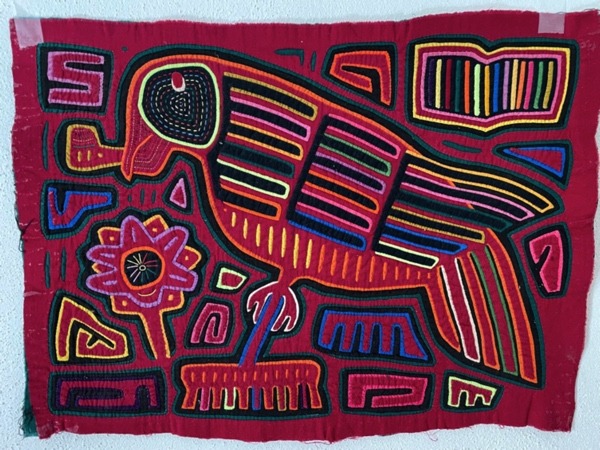
My Mola – stitched by hand, of course
Marge Asman, wife of Commander Bob next door, repairs my hammock expertly (It was ripped by Skip Kaltenhauser on the boat to San Andrés). She sews two little Molas on by hand.
The marines have movies every night, picaresquely described – “Rape, murder, pillage and violence” – and violence?
Marines are very tall in their seats, spring up as from dragon seeds to obscure the screen.
The Canal controversy is very low key here. (Panama is pressing the US to relinquish the Canal Zone to local control). Nobody seems to imagine that much will happen, although John is mostly resigned to a shift of power eventually. Vietnam finally collapses while I’m there. He has a ruminatively resigned appreciation of the faults of USA. Any criticism can be voiced in his presence and receive attention.
He wants to build a house in North Carolina to retire. He will get 75% or more of his full pay. Thinks it’s ridiculously extravagant and seems most worried about the general waste of public money.
The visit culminates in the big party with fairy lights on the green, two bars, an enormous display of warming dishes, but all the work was done by the ladies themselves. Servants in the Zone are paid $2 an hour by order, (two dollars then would be roughly eleven dollars today) and the USN goes out of its way to avoid any charge of exploitation or discrimination against Panamanians. Money buys the image.
John was in submarines – his commands were all under water. I grow very fond of them both, and they make me very welcome, always renewing their invitation to stay on.
April 29th, Monday
I leave for Costa Rica.
PS: Some of you were intrigued by a remark I made in my notes, a few weeks ago. I wrote:
“The explanation of these fits of urgency, interspersed by periods of timelessness, must be explored somewhere.”
I didn’t get around to doing it then but, thinking about it now, it seems to suggest that there are actually two journeys going on simultaneously, the conscious “real life” journey and another subliminal journey across the ocean of the subconscious, sometimes peaceful, sometimes threatened by anxieties, like Scylla and Charybdis, demanding hasty escape.
In 1975 the Panama Canal and roughly 5 miles either side of it was still US territory and called the Canal Zone. Politically I was trying to stay neutral, although the Vietnam War was at its height . . . I had no idea what to expect, but my sponsors, the Lucas company, had an important depot in Panama.
11th April, 1975
Leave San Andrés for Panama on SAHSA plane. $90 all in (tips and tax included)
For some reason I say nothing in my notes about this extraordinary event. The plane was a Lockheed Electra with a Honduras airline, SAHSA – often referred to as Stay At Home Stay Alive. They tried to squeeze my bike into the cargo hold but it wouldn’t fit, so they rolled it up the gangway into the cabin and tied it to the back of the pilot’s seat.
Fly over sea for an hour, then over Colon and parts of the canal (before landing at the airport).
Because some of my luggage seemed to have been lost I wasted time and missed the cargo deadline. So had to return next day for the bike. But all worked out (thanks to the sponsorship of the Lucas agency in Panama).
The Ambassador had me to dinner and found me a hotel. Lucas man, Martin Allen, took me to the airport the following day.
12th April
Taken to visit Colon by a rep. of the David Brown company.
In spite of all the attention I was getting, I was bitterly disappointed to get no mail in Panama. The absence of my pieces in the Sunday Times has had a two-fold effect on me – more subtle one being that it robs me of a form of communication with my friends. If they then fail to write to me I feel lost to them entirely. Why didn’t Jo write? I know that the most probably explanation is that it required too much effort, sorting out how much to say or how little. I am deeply resentful that she can’t even get a postcard off but prevented from expressing my resentment by sense of guilt – or rather my undeservedness. (I walked out. She drove me to it. I failed to satisfy her. She made Utopian demands. I was too weak to resist the temptation to step up on her pedestal. Once up there, there was nowhere to go but down.)
Riding through South America is nothing like riding through Africa. Nor is the second year of this journey like the first. It has taken a while for me to appreciate the cumulative effect of this second continent.
My confidence with the bike is much greater, and I have fewer morbid fears of sudden disaster – though the accidents I’ve had were, if anything, more dangerous than any in Africa.
The experience is more varied and intricate. The psychic pressure is greater – there is more aggression, hostility. The journey is slower, more tiring. I feel much more remote here which combined with absence of mail makes me feel abandoned. But against this there’s Bruno’s company, and Malu’s friendship.
I find myself much more rigidly held by habit than I would like. Although I know that people and situations will respond to my needs, I still find myself reluctant to let go of accustomed sources of comfort and security.¬ Restaurants, hotels, cash transactions, conveniences.
Riding up to Volcan yesterday in Panama, I had to force myself to go on rather than return to the certain comfort of known hotels in Concepcion.
When I arrived in Volcan (because everywhere the grass was too tall and wet for comfort) I looked longingly at the Cabañas and asked a man how much they cost.
Eight dollars – too much. Where else can I go? The pension at five or six dollars. Is there a camping place? He thought about it – then said I could sleep in the garage by the motel.
Out of the conversation my confidence revived. In fact, with my hammock slung between the posts of the porch (which was what the ”garage” turned out to be) I was more comfortable and happy than I would have been in a hotel. The human contact was the essential prerequisite.
The pension Mexico on Av. Del Sur 4 (formerly Av. Mexico) is four streets up from the Av. Balboa, which runs along the coast – but not I think right on the sea; I can’t remember the water’s edge.
The name of the proprietor is Maduro – this is an old name for one of Panama’s richest families. He is brisk, balding, dapper, not afraid of unpleasant details (“I sell combs. They are not expensive. You see, this one is 20 cents. It is so plastic it conforms immediately to the shape of your hand as you drag it over and through a 4-month growth.”)
Or – guests are not allowed to cook, although here’s Pete Shoemaker doing it in front of your very eyes. He has a special dispensation awarded by himself on the grounds that if he’s not allowed to cook, he’s leaving. They would rather have him stay. He pays a daily rate ($6) but lives there by the month. Mrs Maduro is white and all knots and sinews under her kimonos. She hustles and hassles and loves it.
Shoemaker is a young alcoholic sex-maniac. I accused him of not being able to leave the drink alone [The accusation was remote and implicit, but he dug it out] He swore it wasn’t true. When working, he said, he never drank until after work. He has a good face and body, but the skin round his eyes is inky stained. He has just ridden round from Rio to Panama on a Kawa 750. He says there wasn’t anywhere he wouldn’t rather have been in a car.
When he got to Iguacù and found he had to go back to Säo Paulo for some papers, he went there and back non-stop. Curitiba, Säo Paulo, Curitiba, Iguacù, 1200 miles non-stop – mostly at night. Insane.
He didn’t enjoy the journey – just fucking and drinking between rides. Spent $10,000.
“Remember that bridge coming into Ecuador,” he said.
It was in Ecuador, and I remembered it well. Two planks for four-wheeled traffic and only joists in between.
“I fell on it,” I said.
We were both laughing and he howled and shook my hand.
“Me too Pal. Which way did you fall?”
“Into the middle!”
“Jesus! I only fell against the side.”
He says he has screwed every girl in the pension (a very job lot they are too). Says they’re all very discreet about it, but he doesn’t mind telling me. That’s why he stays here. It’s a license to screw, he says.
There’s a Sanyo Widemaster fan in every bedroom. It’s really silent. I have a big double room and fill it as usual with my stuff. There are those louvered windows which you can never open, and lots of recesses in the walls. It’s not a bad life at the Mexico. The style is “rooming house international.” Panama is just a blend.
The Ambassador was leaving on Friday for Boquete with his daughter, to return on Sunday evening. I was invited to use the new pool at the weekend.
Called his secretary (Sheila?) who received me there. There were three women stranded on the concrete round the pool. The first impression was hideous, but of course conversation and attention brought them to life. Sheila was a widow capable of having fun – a compulsive talker – she wore horrible slacks and bent the door of her brand new car on the pillar of the Ambassador’s porch.
With her was a floating 3rd secretary – Scots – who filled in for the holidaying 1st secretary and had massive jellying white thighs and a dour and homely face. The Australian girl had a reasonable figure, but her face had never got finished off properly.
At some point during the week I went to a bank in the city to change my traveller’s cheques into dollars, since that was the official currency of Panama. These were the same cheques that I had been carrying since Rio, nine months earlier, where the Sunday Times had misguidedly arranged for me to receive money in this form. The whole of Latin America was starved for dollars – no bank would give me dollars for my cheques, and the denominations were too high so that I was always left with piles of local currency which lost much of their value when changed at borders.
In Peru I thought I’d found a bank that would give me dollars. After I had countersigned them the bank official told me that I couldn’t have dollars after all. There was a heated exchange, and I took my cheques back but now, in Panama, the bank refused to cash them because they were countersigned, and I would have to have a reputable person to vouch for my identity. In the absence of the Ambassador
I was in despair when an American voice behind me said, “I’ll vouch for him.”
I turned to see an American Naval officer who introduced himself as John Mallard.
“Glad to be able to help,” he said. I thanked him profusely and he gave me his phone number, inviting me to call him any time. He explained that he lived on a naval base in the American Canal Zone. In fact he turned out to be Captain John Mallard, a submariner, and he ran the show.
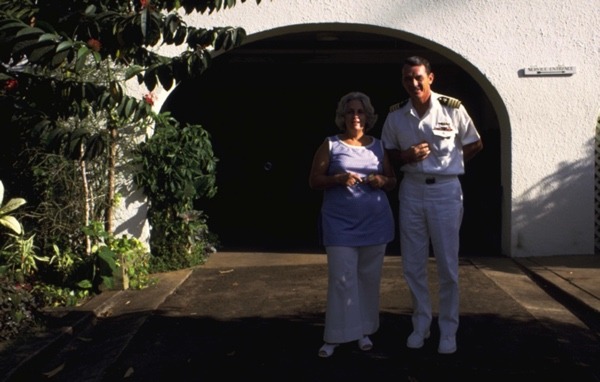
Capt. Mallard and his wife Ann
April 15th
On Sunday I called the Mallards. Was immediately asked over. Within an hour of arriving I was asked to stay there. The change was instant, abrupt. I felt as though the ambulance had finally arrived – the rescuers had spotted me – I was going to be all right. It’s only afterwards that you see how good or bad things were before.

In the Mallards’ garden
Still following my notes from 48 years ago in Cartagena on the Caribbean coast. Trying to get to Panama, but with no idea how to get there, I took my bike on a boat to a pirate island, San Andrés.
At sea
There were flying fish, but no albatross this time. It was a fairly easy sea. Ship was “Ciudad de Zap … something or other.” Captain talked to me once. Said his grandmother was Indian. He looked fairly Indian too. The ship was putting up its entire stock of pennants in a grand show. I asked why. He said, “This is the first visit of the ship to San Andrés.”
How did we get on to drugs?
“I refused to carry them. I have a family in Baranquilla. I have been offered $15,000 just to take one packet, but I value my tranquility too dearly. Some others who went to the naval school with me are already millionaires – but they have no tranquility. Once you carry drugs you can’t stop. They would kill you.”
I can imagine Denis Nahum’s scepticism, but this captain seemed honest to me.
We were two days and nights at sea. The third night we spent anchored on the lee side of the island and then drew in. (One of the ties snapped and the boat crunched on the quayside. No rubbers, either).
9th April
There were two ships at the dockside waiting to leave when I arrived. Both were going to Panama. I felt unhappy about having to leave again within hours but knew I should try. (The explanation of these fits of urgency, interspersed by periods of timelessness must be explored somewhere.)
However the bigger of the boats was going to Bocca de Torres, the United Fruit Company port from which there is no exit other than by boat or by plane. The smaller boat would not take me.
San Andrés. – ten miles long, seven miles wide, reputed haven of Capt. Morgan. Some beaches of crushed white shell and coral – rest, ugly black coral. Two little islands – perfectly round with coconuts, – cartoon desert islands – called Johnny Cay and Aquarium.
Found Amigo Pepa sitting on his lot, watching his new house go up. He said he wanted to preserve the style of the original islanders. Talked about the days before the island got crowded – quoted cheap prices and said nobody used money.
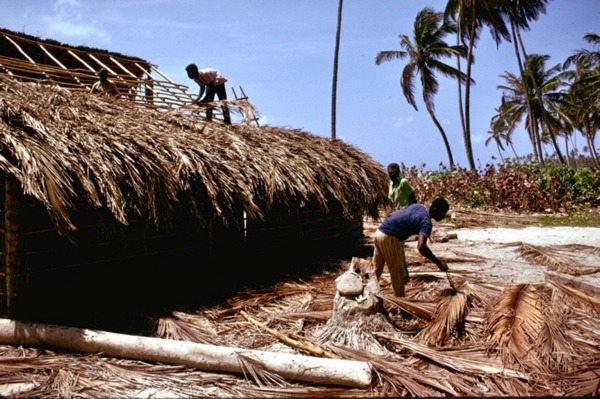
Amigo Pepa’s new house on San Andrés
Said he was building his house out of all natural materials. I was a bit uneasy – it sounded too pat, as though he’d been taking ecology lessons from visiting gringos. He had a carpenter making the frame of the house – a little man with bloodshot eyes called Brachman – named after Dr. Brachman who strode out of the mists of legend to give his name and then apparently disappeared again. Brachman gave an impassioned and drunken eulogy of Dr. Brachman on my second night which was impressively eloquent.
[But I’m still no closer to knowing who this mysterious doctor was].
Slept in hammock between coconuts – the splashes of black against the sky.
Gringo lady with little son – shrieking with anxiety and unaware of it – talking of Pepa as great man – fending me off (for no reason).
The English couple on the boat – he thin, gaunt, bespectacled, looking helpless, but innately tough, she plump, baggy – like babes-in-the-wood. Talking about the fish we were going to grill on the beach.
We got ourselves a four -and-a-half-pound bonito, failing red snapper. Then two huge black men telling us the fire was illegal – move to Pepa’s – the iron bedstead torn out from under a fallen palm to grill on.
Pepa’s green jump suit – his huge son, “I have found bottles in the sea. I have found several bottles in the sea. Yes, several, several, several. I have found several bottles with messages. Sad messages, man. Yes, sad messages. I saw a message in a bottle that broke my heart.”
Pepa said he smoked a lot of dope. He has letters from people in England and USA. Showed me one from Trinity College, Bristol. All charter holiday people to Trinidad, I expect.
The town of San Andrés seems to be called San Luis. In the middle it’s smart cement shops; then up the side of the island past the port, it’s wood. Tarmac, then dirt. Pepa’s is at the beginning of the dirt. You can get into the sea there, over flat rocks, with sea buds growing, and urchins lurking in crevices. Green water, blue sea. So clear. On the Aquarium – looking at fish – glorious.
I spent two nights on San Andrés. Through Skip I met the Argentine couples, Jeanine and Malcolm Donaldson, and Manuel Pedro Peña and his honeymoon wife Pixie – the last with his easy laugh, and easy claim to supreme court judgeship, which is so embarrassing.
Malcolm is a doctor, Jeanine an architect. She has some incurable weakness which makes her unsteady. She can’t drink alcohol. She is very attractive (Skip was aflame). They met in hospital and she wanted to tell me what a very good man he was. He probably is too – but in South America any man who is free of the worst traits of machismo will seem like Christ to any intelligent woman.






